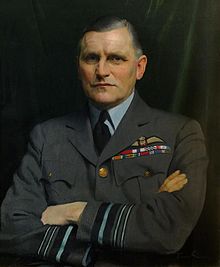Sholto Douglas, 1st Baron Douglas of Kirtleside
Marshal of the Royal Air Force William Sholto Douglas, 1st Baron Douglas of Kirtleside, GCB, MC, DFC (23 December 1893 – 29 October 1969) was a senior commander in the Royal Air Force. After serving as a pilot, then a flight commander and finally as a squadron commander during the First World War, he served a flying instructor during the inter-war years before becoming Director of Staff Duties and then Assistant Chief of the Air Staff at the Air Ministry.
During the Second World War Douglas clashed with other senior commanders over strategy in the Battle of Britain. Douglas argued for a more aggressive engagement with a 'Big Wing' strategy i.e. using massed fighters to defend the United Kingdom against enemy bombers. He then became Air Officer Commanding-in-Chief of Fighter Command in which role he was responsible for rebuilding the command's strength after the attrition of the Battle of Britain, but also for bringing it on the offensive to wrest the initiative in the air from the German Luftwaffe.
Douglas went on to be Air Officer Commanding in Chief of RAF Middle East Command in which role he was an advocate of Operation Accolade, a planned British amphibious assault on Rhodes and the Dodecanese Islands in the Aegean Sea, and was disappointed when it was abandoned. He became commander of the British Zone of Occupation in Germany after the war.
...
Wikipedia

